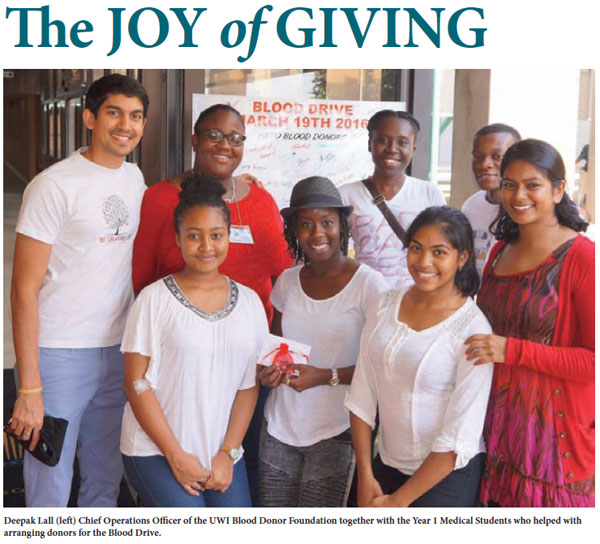
 A father, who is unable to donate blood, brought his wife and two teenaged children to do so. A student, whose low body weight means she cannot donate blood, brought her mother to make her second donation; and first-year medical students were enthusiastic partners in the 2016 Blood Drive. A father, who is unable to donate blood, brought his wife and two teenaged children to do so. A student, whose low body weight means she cannot donate blood, brought her mother to make her second donation; and first-year medical students were enthusiastic partners in the 2016 Blood Drive.
These were high points for Dr. Kenneth Charles, Chairman, of The UWI Blood Drive Foundation (UWIBDF), and he was even more thrilled that the Drive yielded 73 pints of blood, the highest ever.
Dr. Charles reflected on how the UWIBDF was established in 2011 during a period of acute chronic blood shortage brought on by an attempt to change from replacement to voluntary non-remunerated blood donation (VNRD). He was Director of the National Blood Transfusion Service at the time, and it was depressing.
“It was clear that the population and its health care professionals had not been adequately sensitized to the need for change. At around this time, I joined The University of the West Indies and continued to explain the need for VNRD to my students. Their response to shared information has astounded me. Through several voluntary and religious groups, they immediately committed to raising awareness in the UWI and our communities through research, education and example.”
UWIBDF was officially launched in 2013 with the University's Chancellor Sir George Alleyne as its willing patron.
“Its Chief Operating Officer, Mr. Deepak Lall, is not a medical person but an engineer with a heart of gold and social passion to match it. Public Relations Officer is Mr. Ryan Persad, one of my students of whom I am immensely proud,” says Dr. Charles.
“Today’s drive was an overwhelming success, as we collected the most voluntarily donated pints ever in a single day in Trinidad and Tobago. A total of 73 pints were collected voluntarily, comprising 37 male and 36 female donors. It was fantastic to see such a high turnout of female donors, as historically around the world women have a greater fear of donating blood,” said Mr. Lall.
He said that the number of donors has been steadily increasing over the past year when it has been done every three months. The first drive yielded 13 donations, the second, 22 and the third, 69.
“Trinidad and Tobago currently has less than one third of the recommended blood supply. The main reason for this is because blood is only donated in times of emergency; for example if a family member or friend needs surgery, or gets into an accident.”
He said that blood is usually donated non-voluntarily or remuneratively at various blood banks. “Remuneration donation means that blood is claimed by an individual via a donor card or issued in the form of a chit for use. When this is done, this means that the donated blood already has an intended use and the nation’s supply can never be boosted significantly. There are also many disadvantages to donating non-voluntarily as it opens the way for the sale of blood, which is illegal according to the Human Tissue Transplant Act.
“Another alarming occurrence is that when donating non-voluntarily, people are motivated to do what it takes to donate. Even if it means falsely answering questions when being interviewed, which can lead to infected blood getting into our blood banks, as tests cannot detect certain viruses at early stages.
“Voluntary donation is when you donate for nothing in return. That means the blood is used for anyone, at any time and has many advantages. In developed countries, blood donated voluntarily has a zero per cent infection rate in their blood banks.
“Most importantly donating voluntarily adds to the nation’s supply, for everyone’s benefit and can help curb the panic of emergency donation when a loved one needs it most,” he said.
|





